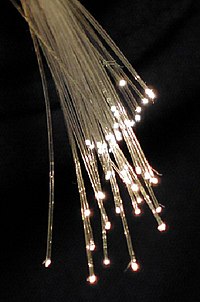
Photo from wikipedia
Abstract Polyimide (PI) is one of the lightweight and high-performance materials, having great potential to be used as reinforcements for advanced composites. Quantitative evaluation of fiber/matrix interface is critical in… Click to show full abstract
Abstract Polyimide (PI) is one of the lightweight and high-performance materials, having great potential to be used as reinforcements for advanced composites. Quantitative evaluation of fiber/matrix interface is critical in designing fiber reinforced polymer composites. However, there is a lack of effect characterization methods to measure the interfacial shear strength (IFSS) of polyimide fiber (PIF) due to its high failure strain. In this study, a modified single fiber fragmentation test (SFFT) was proposed to solve this problem. By employing Polyurethane (PU) resin as an additive in commercial epoxy resin, a transparent PU modified epoxy (PU-epoxy) resin is obtained. The PU-epoxy has a failure strain of 137.93%, which is much larger than 14.83% of the PIF, meeting the pre-requirement of SFFT. Oxygen plasma treatment is applied to modify surface properties of the PIF to improve its interfacial adhesion with epoxy. Statistical results show that a plasma-treated PIF for 4 mins achieves a 125.41% increase in IFSS compared with the pristine PIF. Meanwhile, a finite element model (FEM) is created to simulate and visualize stress distribution in fiber, interface, and matrix during the SFFT.
Journal Title: Applied Surface Science
Year Published: 2020
Link to full text (if available)
Share on Social Media: Sign Up to like & get
recommendations!